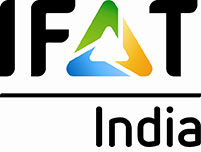IFAT India: Industrial wastewater management industry in India is booming
- India’s industrial wastewater management sector increases investment
- German companies rate market opportunities for higher-quality technologies as good
- Needed: system solutions and human resources
India currently experiences the worst water crisis in its history. And the demand for the vital resource will continue to rise. With a share of 79 percent, farming still is India’s largest consumer of water. However, the industry catches up: while the industrial sector accounted for five percent of the total of 634 billion cubic meters of water, the demand will quadruple by 2030 according to the German Federal Ministry for Economic Affairs and Energy (BMWi). An outlook that provides a boost to the country’s industrial wastewater management industry.

One thing is clear for Bhupinder Singh, CEO of Messe München India and organizer of IFAT India – India’s leading environmental technology trade fair: “In view of the acute scarcity of water, the industry is more than ever before required to treat wastewater and then reuse it. We can simply no longer afford to not make maximum use of our most valuable resource.” Many sectors such as the chemical, pharmaceutical or food industry use large amounts of water for manufacturing and processing, washing processes, dilution or for cooling purposes.Indian companies increasingly invest in treating the resulting wastewater: according to BMWi, experts expect the expenditures on corresponding technologies to grow annually by five to ten percent.
Major market potential for industrial wastewater treatment
German companies that already operate on the Indian water and sewage market confirm the increased demand for solutions for treating industrial wastewater. For companies from abroad, Christian Ziemer, Manager Business Development and Strategy, Water & Wastewater at Siemens AG not only sees market opportunities in cooperating with large Indian businesses; also small and medium-sized companies increasingly invest in innovative water and wastewater solutions. Here, he anticipates an annual growth rate of ten to twelve percent. “In India, there is heightened demand for higher-value technologies that meet the legal requirements which have become stricter,” Ziemer explains.
Franz Heindl, Director International Sales at Huber SE shares this view: “This sector’s market potential currently is higher than the one of municipal sewage treatment, as the statutory provisions put enormous pressure on companies that in turn need to react fast. In the medium to long term, however, the municipal need will by far exceed the industrial one.”
System solutions are in demand
In technological terms, for large Indian companies Jürgen Hannak, Senior Project Manager at adelphi sees a need for high filtration and oxidation systems, solutions for sewage sludge disposal and for energy management solutions in sewage treatment plants. Also challenges due to “microplastics” and “pharmaceuticals in wastewater” are increasingly discussed now and the recovery of chemical compounds such as phosphorus meanwhile come to the center of attention. “Indian enterprises are primarily interested in system solutions. Conventional component solutions do already exist,” Hannak says. This, just as in the field of human resources, mainly requires collaborative projects.
Meeting place for the industry: IFAT India 2018 in Mumbai
In addition to other solutions for sewage, water, waste and recycling, exhibitors at IFAT India – which will open its doors from October 15 to 17, 2018 in the Bombay Exhibition Centre (BEC) in Mumbai – will present innovative technologies for industrial wastewater management. After the successful outcome in the previous year – 6,765 professional visitors and 184 exhibitors – this year also pledges to be record breaking: with an exhibition space expanded by almost 50 percent IFAT India 2018 expects around 200 exhibitors. Education and training of specialist staff is also on the agenda of the Indian edition of the world’s leading trade fair IFAT: tailored to the particular needs of the Indian environment sector, the Active Learning Center will offer practical training, live demonstrations and professional competitions for young talents and skilled workers.
More information on IFAT India 2018 is available at www.ifat-india.com.
About IFAT India
IFAT India is India’s leading environmental technology trade fair for the segments water, sewage, solid waste and recycling. With an exhibition space of around 8,100 square meters, the last editionsaw 184 exhibitors from 18 countries and 6,765 visitors from 35 countries. The annual trade fair takes place in the Bombay Exhibition Centre (BEC) in Mumbai – the next time from October 15 to 17, 2018 in Hall 4.
IFAT worldwide
Messe München´s competence in organizing environmental-technology events is demonstrated not only in the world´s leading trade fair for the sector, IFAT, but also in a range of other international trade exhibitions around the world. The spectrum encompasses IFAT Africa in Johannesburg, IFAT Eurasia in Istanbul, IFAT India in Mumbai, and IE expo in Shanghai. With IE expo Guangzhou there is now also a regional edition of the trade fair, focusing on the market in South China.
Messe München
Messe München is one of the leading exhibition organizers worldwide with more than 50 of its own trade shows for capital goods, consumer goods and new technologies. Every year, a total of over 50,000 exhibitors and around three million visitors take part in more than 200 events at the exhibition center in Munich, at the ICM – Internationales Congress Center München and the MOC Veranstaltungscenter München as well as abroad. Together with its subsidiary companies, Messe München organizes trade shows in China, India, Brazil, Russia, Turkey, South Africa, Nigeria, Vietnam and Iran. With a network of associated companies in Europe, Asia, Africa and South America as well as around 70 representations abroad for over 100 countries, Messe München has a global presence.
